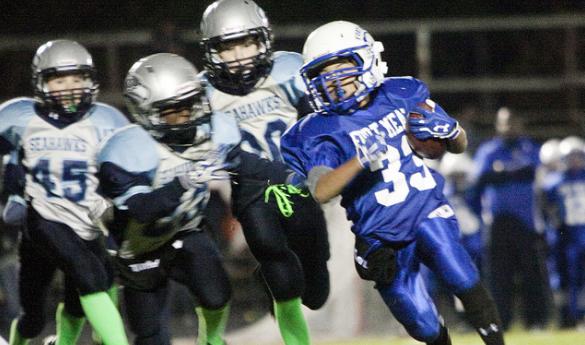Mason ACHIEVES combats concussions in new partnership with Prince William County schools
George Mason University, in association with Prince William County Schools and the Potomac Health Foundation, has established the ACHIEVES Project. The project aims to assist local High Schools and Middle Schools in cooperating with Virginia’s Student-Athlete Protection Act and to provide better health services to students who suffer a concussion.
In 2006, Zach Lynstedt received a seemingly minor concussion while playing on his middle school football team. After briefly sitting on the sidelines, he was allowed back into the game after coaches underestimated the extent of his injury. Zach collapsed after the game, slipped into a coma, and was rushed to the hospital.
After three months in a coma, he woke up. But it would not be until over a year later that he could move his arms or legs, and two years before he could eat independently. His native state of Washington passed a new law requiring stricter observation and care to student-athletes who’ve suffered an injury. Thirty two other states have passed similar laws, including Virginia, whose Student-Athlete Protection Act went into effect on July 1, 2011.
The legislation requires students and parents to sign written permission to play any sport and acknowledge understanding of “rules and regulations concerning concussions.”
Students who’ve suffered a concussion must be removed from the game or practice, and must be authorized by a licensed healthcare professional before returning to play. In addition, SB 652 requires the Department of Education to help expand policies to inform and educate coaches, student athletes, and their parents or guardians on the risks associated with concussions.
However, this unfunded mandate leaves schools scrambling to meet the new legislation requirements within the confines of their present budget. To assist the local schools as well while offering graduate students real world experience, staff at Mason and Prince William County Schools applied for two grants to help create ACHIEVES (Advancing Healthcare Initiatives for Underserved Students). ACHIEVES provides three Prince William County High Schools with graduate students from Mason to help identify and treat concussions in student-athletes.
Shane Caswell, the co-director of ACHIEVES, emphasizes the necessity for the program in the local schools:
“The program also helps graduate students receive experience, currently in Woodbridge, Garfield, and forest park high schools. Our Athlete trainers are receiving a great learning experience, and we’re noticing that more injuries are being recognized and properly treated. Students are getting a great experience, athlete trainer at the school receiving help, and the students are receiving better care. Through these efforts we are keeping these student athletes healthier and we’re keeping the small injuries from becoming larger issues.”
Prince William County has only one certified athlete trainer per high school, who is also doubles as a teacher.
“I would really like to see the program expand in the future,” Caswell said. “We have also worked Prince William Health Services Foundation to fund a student to work at Battlefield High School.”
As the program grew, it quickly became apparent that there were other issues that prevented students from receiving treatment they needed. They created a centralized medical record-keeping system for all 27 schools in Prince William County.
“We realized that in Prince William public schools, there was no mechanism to understand what the burden of injury was after the school activity,” Caswell said. “We are tracking injuries that happen throughout the county. All of that information gets sent to the central administration offices. We collate that information and we can better understand the nature of these injuries in after school activities. This helps us with prevention and intervention strategies. It might result in change of policy in schools, enhancement of care, change or rules, and how athletes are cared for.”
One particular aim of ACHIEVES is to assist in the school’s relationships with students and parents.
“The law has a mandate that every year students and their parents or guardians must be educated about concussions,” Caswell said. “We’ve helped the country to deliver this information and we’ve helped inform more than 50,000 people. About 280 sessions for parents and students. We also created an online system where students and parents can get this training online. We’re doing all of this education for a middle school and high school level.”
An update on the bill, HB 1719 for “Concussion education, awareness & management” failed to pass the Virginia House Subcommittee for Education. The update, which would have expanded the legislation to cover non-school affiliated sports groups that utilize public property, was tabled inevitably by a vote of 5 to 3 following concerns about enforcement.
In the meantime, over its two years of implementation, the ACHIEVES Project has helped several nearby schools update their student health programs and meet the demands of the Student-Athlete Protection Act.
“We’re helping the county develop guidelines for those suffering from concussion into the classroom and developing new and healthy strategies,” Caswell said. “The concussion is a brain injury, and it needs to be treated seriously.”

